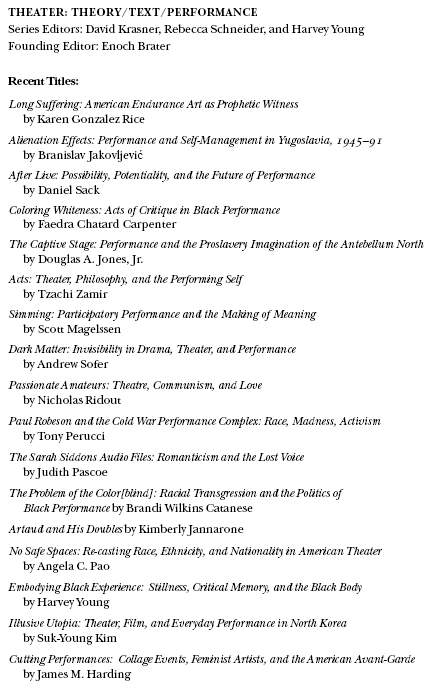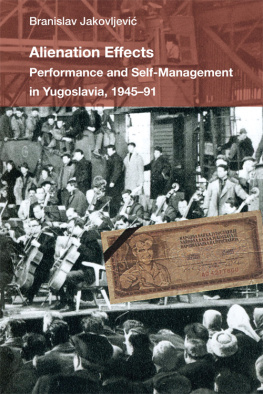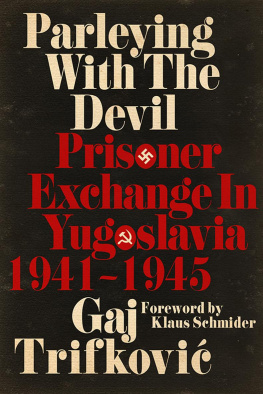Branislav Jakovljevic - Alienation Effects: Performance and Self-Management in Yugoslavia, 1945-91
Here you can read online Branislav Jakovljevic - Alienation Effects: Performance and Self-Management in Yugoslavia, 1945-91 full text of the book (entire story) in english for free. Download pdf and epub, get meaning, cover and reviews about this ebook. year: 2018, publisher: University of Michigan Press, genre: Politics. Description of the work, (preface) as well as reviews are available. Best literature library LitArk.com created for fans of good reading and offers a wide selection of genres:
Romance novel
Science fiction
Adventure
Detective
Science
History
Home and family
Prose
Art
Politics
Computer
Non-fiction
Religion
Business
Children
Humor
Choose a favorite category and find really read worthwhile books. Enjoy immersion in the world of imagination, feel the emotions of the characters or learn something new for yourself, make an fascinating discovery.
- Book:Alienation Effects: Performance and Self-Management in Yugoslavia, 1945-91
- Author:
- Publisher:University of Michigan Press
- Genre:
- Year:2018
- Rating:4 / 5
- Favourites:Add to favourites
- Your mark:
- 80
- 1
- 2
- 3
- 4
- 5
Alienation Effects: Performance and Self-Management in Yugoslavia, 1945-91: summary, description and annotation
We offer to read an annotation, description, summary or preface (depends on what the author of the book "Alienation Effects: Performance and Self-Management in Yugoslavia, 1945-91" wrote himself). If you haven't found the necessary information about the book — write in the comments, we will try to find it.
Alienation Effects: Performance and Self-Management in Yugoslavia, 1945-91 — read online for free the complete book (whole text) full work
Below is the text of the book, divided by pages. System saving the place of the last page read, allows you to conveniently read the book "Alienation Effects: Performance and Self-Management in Yugoslavia, 1945-91" online for free, without having to search again every time where you left off. Put a bookmark, and you can go to the page where you finished reading at any time.
Font size:
Interval:
Bookmark:
 Page i
Page i  Page ii Page iii
Page ii Page iii Branislav Jakovljevi
Ann Arbor
University of Michigan Press
Page ivCopyright 2016 by the University of Michigan
All rights reserved
This book may not be reproduced, in whole or in part, including illustrations, in any form (beyond that copying permitted by Sections 107 and 108 of the U.S. Copyright Law and except by reviewers for the public press), without written permission from the publisher.
Published in the United States of America by the
University of Michigan Press
A CIP catalog record for this book is available from the British Library.
ISBN: 978-0-472-07314-6 (hardcover: alk. paper)
ISBN 978-0-472-05314-8 (paperback: alk. paper)
ISBN 978-0-472-12198-4 (e-book)
ISBN 978-0-472-90058-9 (open access e-book)
To Nikola and Maria
Page vi Page vii- Page viii
I dedicate this book to my children, Nikola and Maria. Yugoslavia will be a part of their lives more than they will ever be able to knowso much for intangible heritage. I would have not been able to write this book without the commitment and support of my wife, Jasminka. Much more than the translations from the French in this book is hers.
In Alienation Effects, I investigate the transformation of performance, broadly conceived, in Yugoslavia in the postWorld War II period. In the period that extended from the establishment of self-management as the dominant ideological and economic model, contemporaneously with early experimental work in theater and visual arts, to the hyperinflation that spelled the end of the Yugoslav brand of labor and highly visible postmodern cultural productions, the concept of performance in Yugoslavia spanned a broad range of activities, from labor organization to conceptual art. Instead of composing a historical survey, in this book I have tried to understand different historical periods by focusing on a select number of case studies, each of them requiring a different methodology. My work on the 1950s and early 1960s was based on archival research in Serbia and the United States. This painstaking labor was made easier by the assistance of friendly staff of the Archive of Yugoslavia (Arhiv Jugoslavije), Museum of Yugoslav History (Muzej istorije Jugoslavije, especially Momo Cvijovi), and the Hoover Institute library at Stanford University. I am grateful to Mary Munill from the Stanford Library office for Interlibrary Borrowing. Throughout the process, I relied on generous help of my friends from the National Library of Serbia (Narodna biblioteka Srbije): Svetlana Gavrilovi, Sreten Ugrii, and Saa Ili. In my research on the late 1960s and 1970s (and beyond) I employed both archival and ethnographic fieldwork methods. I am grateful to Slavica Vukadinovi, Srjan Veljovi, and Stevan Vukovi for their help in accessing archival material held in Belgrades Student Cultural Center (Studentski kulturni centar, SKC). These documents came to life through my conversations with some of the main protagonists of the conceptual art Page x scene in Belgrade of the 1970s and 1980s, Slobodan Era Milivojevi, Raa Todosijevi, Zoran Popovi, and Jasna Tijardovi. I offer my thanks to them for sharing their time and memories with me, and for giving me a permission to use the photographs of their performances in this book. Big thanks to Mladen Stilinovi and Branka Stipani for their help in obtaining the images of Mladens works and the permission to use them. I also want to thank Dunja Blaevi, Ljubica Mrkalj, Neboja Jankovi, and arko Papi for providing me with important information about their activities on the Belgrade art scene of the 1970s, and Goran orevi for letting me use images of some of his works. I also want to thank Marinko Sudac, Irwin, Belgrade Student Cultural Center (SKC), and Anne Marchand for allowing me to use the images from their collections. The image on the book covers was made during the concert of Belgrade Symphony in Train Factory Goa in Smederevska Palanka on the occasion of Youth Day, on May 25 1954. I made every poossible effort to find the person who made this photograph, but to no avail. The cover was designed by Belgrade-based multimedia artist group kart. My thanks go to ore Balmazovi and Dragan Proti for their flexibility and for doing great work under pressure of deadllines. I also want to acknowledge the work of a new generation of artists, theoreticians, and art historians whose critical interpretation of conceptual art in Serbia and Yugoslavia was important for my own work: Milica Tomi, Branimir Stojanovi, and Jelena Vesi.
My archival research and fieldwork would not have been possible without support from the Hellman Foundation and Stanford University. Just as important as financial support was the intellectual and institutional support of Harry Elam, under whose tenure as department chair of Stanford Drama/TAPS I started this book, and of Alice Rayner, who chaired the department when I finished. My special thanks to Peggy Phelan for her friendship, support, and guidance throughout this period, and beyond. I want to thank them and my other colleagues for providing a cordial and supportive work environment. They taught me that self-management is not only a principle of labor organization, but also a very delicate art of working together. It is an art of generosity and care, and is not limited to immediate interactions. In my labor on this book I benefited enormously from Amelia Joness comments, from Mariellen Sandfords copyediting, and from the patience and understanding of my editor, LeAnn Fields. Ljubia Mati made indexing into an art form. I am indebted to him for his attentiveness to every word and letter in the book. He was the last line of defense against typos and other omissions. I am Page xi solely responsible for any mistakes, large and small, that made it into the published version of the book.
My work on this book started long before I even thought of writing it. It was fueled by the unraveling of the country where I was born and raised. I received my first lessons about self-management as an egalitarian practice and its distortions as an ideological discourse from my parents, Branislava and Rado; I articulated my first critiques of Yugoslav politics in conversations with my sister Lidija. This daily exercise of critical thinking continued over the years through dialogues with my friends Perica Gunji, Milan Rakoevi, Pavle Levi, and many others. I hope that in this book captures some of the verve and passion of these shared experiences.
Page xii Page 1In Perestroika Timeline, the Saint Petersburg art collective Chto Delat? establishes a connection between the crisis that spelled the end of the Cold War and the one that shook world markets some twenty years later. The second and third items on this what if list had already occurred in Yugoslavia during the 1950s and the 1960s with the establishment of workers self-management as the official doctrine of its political economy. Perestroika Timeline concludes precisely with the year in which the wars of succession after the dissolution of Yugoslavia commenced, putting an end to any hope for the survival of this kind of self-management. By the time Perestroika Timeline reached museums in Europe and the United States, Yugoslav self-management was buried under two decades of war and transition to capitalist economy.
Next pageFont size:
Interval:
Bookmark:
Similar books «Alienation Effects: Performance and Self-Management in Yugoslavia, 1945-91»
Look at similar books to Alienation Effects: Performance and Self-Management in Yugoslavia, 1945-91. We have selected literature similar in name and meaning in the hope of providing readers with more options to find new, interesting, not yet read works.
Discussion, reviews of the book Alienation Effects: Performance and Self-Management in Yugoslavia, 1945-91 and just readers' own opinions. Leave your comments, write what you think about the work, its meaning or the main characters. Specify what exactly you liked and what you didn't like, and why you think so.










